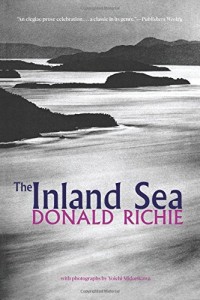JQ Magazine: Book Review — ‘The Inland Sea’

“Richie’s acerbic humor and wit are coupled with lush scenery and descriptions, offering an intoxicating and wry getaway.” (Stone Bridge Press)
By Alexis Agliano Sanborn (Shimane-ken, 2009-11) for JQ magazine. Alexis is a graduate of Harvard University’s Regional Studies-East Asia (RSEA) program, and currently works as a program coordinator at the U.S.-Asia Law Institute of NYU School of Law.
The Inland Sea by the late Donald Richie is a legendary book in the Japan field. For many, it’s their first foray into the culture. Following Richie as he sets sail across the Seto Naikai, the body of water which spans between the islands of Shikoku, Honshu and Kyushu, The Inland Sea chronicles Richie’s quest for authenticity and escape. There, among the hamlets and fishing villages which dot the coastline, he paints for the readers a sun-drenched and hazy seascape; encapsulating his journeys into a memoir, history, and travel book all at once.
Originally written in the early sixties, published in 1971 and subsequently reprinted over the years, the newest edition by Stone Bridge Press deserves a place of honor on your bookshelf—and in your mind. Richie’s acerbic humor and wit are coupled with lush scenery and descriptions, offering an intoxicating and wry getaway. The book is a solid combination of sardonic and sublime. Written as a series of essays, it’s easy to thumb through the pages, find a spot at random, and pick up at a new leg of the journey with Richie—just as he catches a boat with the tide.
This edition also features photographs by Yoichi Midorikawa, the Japanese photographer renowned for his black and white photographs which highlight the scenic, if not austere, beauty of Japan. These images complement the narrative, helping to conjure up a sense of lonely nostalgia. Despite the wonder of the world Richie paints for us, it is one where undercurrents follow mercurial moods as the author mulls on life, Japanese society, and the ever-worshiped god of “progress.” The first sentence to the book sets the tone: “Kobe, from where I have just come, is indication enough of Japan’s sad future.”
Despite the passage of time, his introspections seem quite familiar for anyone who has experienced Japan beyond boisterous Tokyo and murmuring Kyoto. His portrayal of the country is as much bright as it is bleak: When looking at this work in a larger context, we come to understand that it was a piece written on the brink of industrial inundation. In a few short years, the economic uptick would roar into full throttle, overflowing the country with progress and development to the furthest reaches of its borders. Though brilliant and bold, this transformation of the sixties and seventies was at the cost of traditions, the environment, and culture. Richie both understands and despises this transition, and has encapsulated this moment as no other author (save Alan Booth) ever has.
What makes it all so much better is that the backdrop against these struggles is none other than an overlooked part of the country. The Inland Sea, as we come to learn, is no more backwater than it is cosmopolitan. It is a region soaked in lore and legend, commerce and trade. Like all buried treasure, it is so commonplace that it’s unnoticed. It is into the unspoilt and idealized past which Richie wishes to escape. His efforts, however, are illusive. Only rarely does he encounter the sublime he so desperately seeks; even the quaint scenery becomes tiresome as his journey progresses. Yet, for us readers, with each new chapter there is something painstakingly crafted and hauntingly beautiful to be discovered. Richie’s words capture it faithfully; flitting from shadowy shrines, the golden mirror of a subdued sea, to the haphazard arrangements of houses and boats that form a hamlet.
Upon finishing this work, I was curious to know what other readers thought. Some find it insightful and penetrating, while others call it Orientalist and generalizing. Both sentiments seem correct, though that is part of the joy and frustration found in reading it. As Richie writes: “I live in this country as the water insect lives in the pond, skating across the surface, not so much unmindful as incapable of seeing the depths.” This book is decidedly honest, brutal, sardonic and irrepressibly lonely in the way that only a foreigner can understand.
In the end, what Richie leaves us with is acceptance: the future will come, and the island-life may fade—yet pockets of the past will always remain. The memory of his adventures will content him, crystallizing forever. This time and these experiences are never to be captured again: Experiences we have had, places seen, people met—all become a memory as we progress forward.
For more JQ magazine book reviews, click here.


Comments are closed.